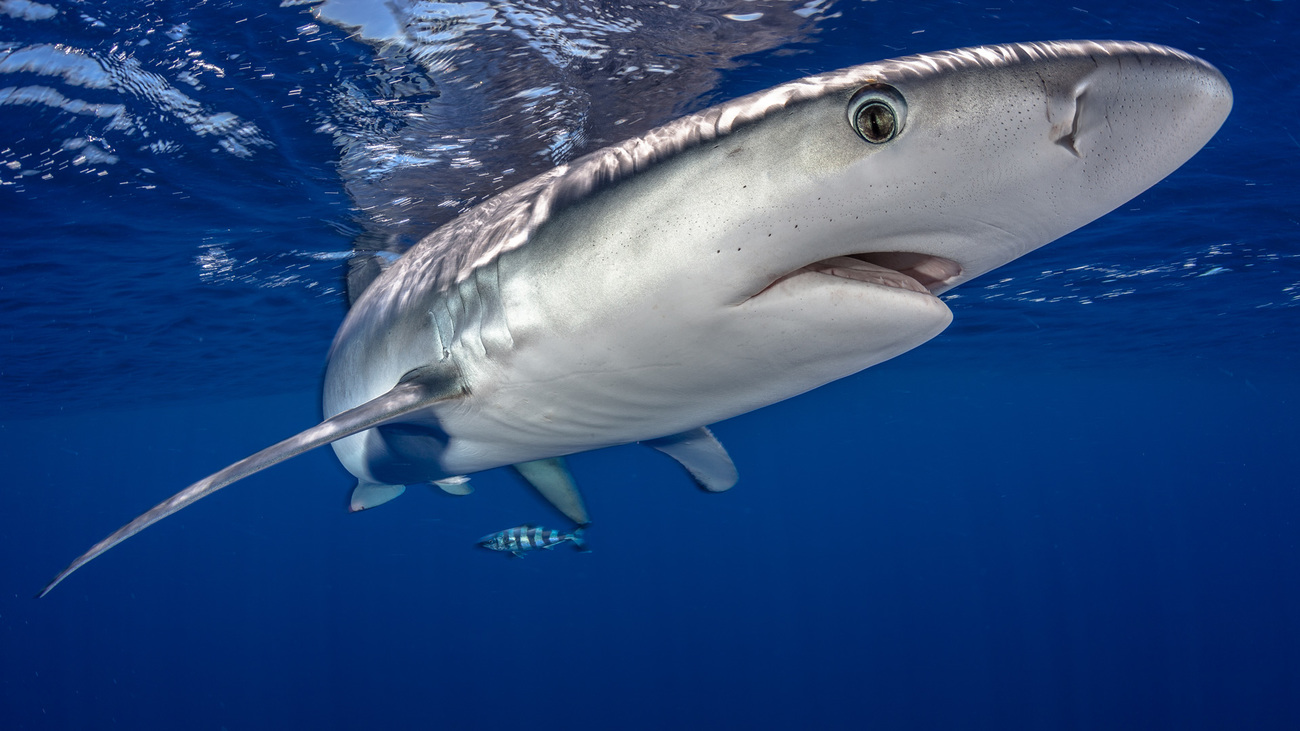IFAW urges EU to put biodiversity commitments into action for sharks
IFAW urges EU to put biodiversity commitments into action for sharks

(Brussels, Belgium – 30 May 2022) – IFAW (International Fund for Animal Welfare) is calling on the European Union and its Member States to sign on to Panama's proposal for increased protections of requiem sharks, including the blue shark and other lookalike species. Support is crucial given that requiem sharks make up the majority of the poorly regulated and largely unsustainable shark fin trade.
Panama has proposed all Endangered and Critically Endangered requiem shark species for Appendix II listing at the Convention on International Trade in Endangered Species (CITES) 19th Conference of the Parties (CoP19) this 14-25 November 2022. Suffering population declines upwards of 70% to local extinctions, these species proposed clearly meet CITES listing criteria, and trade management for these species and their lookalikes is urgently needed.
“The requiem shark proposal—including the blue shark as a lookalike—has been found by EU scientific review to fully meet CITES guidelines for such listings and as such must be supported by the EU and its Member States,” said Megan O’Toole, Director of International Policy at IFAW. “It will finally afford protections for the most endangered shark species while allowing healthy shark populations to remain in trade but with proper management.”
Global shark declines are driven by international demand for shark fins and meat, coupled with widespread lack of management for both the catch and trade of shark species.
In addition to the 19 species proposed for listing, the proposal also includes the rest of the requiem shark family, all of which have been determined by shark identification experts to be lookalikes in their most commonly traded forms. Removal of any one of the proposed species, or the listing of only a subset of the family would create an identification and enforcement process that would be incredibly challenging—especially for governments that have limited capacity.
“The world has made significant progress in its management of sharks and rays in recent years, but the actions taken have not been enough,” said O’Toole. “Shark populations continue to decline rapidly worldwide. Proper oversight of this CITES listing will ensure that any EU trade in shark fins and meat is sustainably and legally sourced.”
IFAW experts urge that the blue shark is necessary to include in trade management efforts, as in trade, its fins and meat are difficult to separate from other species that are protected. Removing the blue shark from this proposal increases the risk of illegally sourced and traded shark fins being laundered among large shipments of blue sharks.
The EU’s leadership is crucial, as the bloc were the source of 45% of shark fin products imported by major Asian trade hubs in 2020 according to a recent report by IFAW, Supply and Demand: the EU’s Role in the Global Shark Trade. Once adopted, this proposal would ensure that the vast majority of the global shark fin trade is managed via CITES preventing further overexploitation at a crucial time for these endangered shark species.
ENDS
Note to editors:
- Related photos and videos can be found HERE.
- IFAW’s recent report, Supply and Demand: the EU’s Role in the Global Shark Trade Supply and Demand: the EU’s Role in the Global Shark Trade
- More than 50% of shark species are threatened or near threatened with extinction, and pelagic sharks (species of sharks found on the high seas) have declined more than 70% in only a 50-year period.
- CITES currently manages just 25% of global shark fin trade. The current proposal would effectively put nearly all of the global fin trade under management.
- Blue sharks are included in Panama’s proposal as a lookalike species, meaning that declines in their populations not relevant to whether or not they should be listed along with the rest of the family. The rationale for their inclusion in this proposal are due to the difficulty for customs and enforcement officers to visually differentiate in trade from other Endangered and Critically Endangered requiem sharks, which has been verified by shark identification experts.
- To assist governments to better implement this listing holistically, Panama is also working with established shark trade experts to create an ID guide that works to the family level for review by Parties ahead of CoP19 this November.
Press Contact:
Benjamin Wiacek
Communications Manager
m: +32 (0)472 17 15 81
e: bwiacek@ifaw.org
About IFAW (International Fund for Animal Welfare)
IFAW is a global non-profit helping animals and people thrive together. We are experts and everyday people, working across seas, oceans and in more than 40 countries around the world. We rescue, rehabilitate and release animals, and we restore and protect their natural habitats. The problems we’re up against are urgent and complicated. To solve them, we match fresh thinking with bold action. We partner with local communities, governments, non-governmental organizations and businesses. Together, we pioneer new and innovative ways to help all species flourish.
Related content
Every problem has a solution, every solution needs support.
The problems we face are urgent, complicated, and resistant to change. Real solutions demand creativity, hard work, and involvement from people like you.